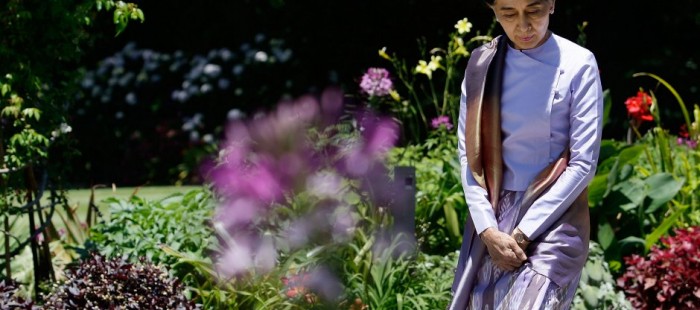*This post of mine was also published on The Daily Beast.*
If you blinked, you may have missed the meeting between Prime Minister Sheikh Hasina of Bangladesh and Myanmar’s current Opposition Leader and Nobel Laureate, Aung San Suu Kyi, at the beginning of this month. Both women inherited their political capital from their late fathers, a nod to South Asia’s long love affair with political dynasties, and met for the first time as Dhaka’s reclusive neighbor hosted the third Bay of Bengal Initiative for Multi-Sectoral Technical and Economic Cooperation (BIMSTEC).
The female leaders talked about giving micro-loans to rural women, and even discussed the desperate need Bangladesh has for Myanmar to curb the intense trafficking of meth pills (known as yaba) across the countries’ borders. But neither Hasina nor Aun San put enough emphasis on the plight of the Rohingya people, Burma’s Muslim population, who are denied citizenship and legal rights by the Myanmar government.
Bangladeshi press report that Sheikh Hasina alluded to the issue when she stated her desire to resolve the refugee crisis between the two countries, but this is one of the biggest issues hanging over both Bangladesh and Myanmar for decades. The crisis intensified two years ago when widespread rioting and deadly clashes between Rakhine Buddhists and Rohingya Muslims grabbed the international community’s attention. Since then, aside from brief periods of relative calm, violence has only increased as the leaders in both countries continue to wash their hands of any responsibility for the Rohingya.
Myanmar suggested that the ethnic Muslims should be removed from the country, while Sheikh Hasina states that Bangladesh cannot be held accountable for the refugees, even banning international aid organizations that work with them from being able to operate inside the country. In the latest sweep of violence in January, 40 Rohingya men, women, and children were killed. While Bangladesh leadership has its own part to play, it is Suu Kyi’s silence on the issue that I find particularly deafening, probably because I have romanticized her since I was a child.
When I was growing up in Bangladesh, Burma’s Aung San Suu Kyi amazed me. Burma is right next door to us geographically, but as a little girl all I understood about the military junta there was primarily through pictures. I just could not wrap my head around what kind of threat a tiny woman, with her iconic bright and colorful flowers carefully tucked behind her ear, posed to these big men with guns. Clearly the military’s worries went beyond what Suu Kyi represented to them physically. This woman personified the heart and the spirit of the long winding road Burma tread to democracy.
In my adult years, Suu Kyi’s imprisonment lasted well over a decade. Forced to be a prisoner in her own home, Suu Kyi became known worldwide as a champion for the core principles of democracy. Nobody embodied the fight for a people to choose their own government the way she did. Her release from house arrest in 2010 signaled a new era in a country still waking up from the tight grip of five decades of military rule.
How can a woman the world has watched fight for her people against the might of a military junta not have a word to say when an entire section of her country’s population is being violently attacked? How can “The Lady” stay silent as her people continue to kill one another? It is shocking, to say the least. And why is the world being silent about Suu Kyi’s silence? Despite not taking action on the plight of the Rohingya, she continues to evade any international reprimand.
It is as though no one wants to say anything bad about a woman we hold so dear. We clearly idolized her to the point of no return. We imagine and worship her as a maternal political warrior, and that is how we want her to remain. We want to believe that the fight Suu Kyi waged for a “free” Burma included the Rohingya people as well, but the sad truth is that Suu Kyi’s silence is a testament to how deep prejudice against the Rohingya runs.
As both the Bangladeshi and Burmese governments continue to abdicate responsibility, the war on Rohingyas remains a moral failure on part of both countries. Who could better facilitate a solution to the crisis than Suu Kyi? If she took on resolving this conflict, I have no doubt the international community would support her 100 percent, which makes her inaction all the more heartbreaking.
We have waited decades to see Burma’s Aung San Suu Kyi ascend toward what we all believed was her rightful political throne. We watched with bated breath as she finally won freedom, and took her rightful place in the country that imprisoned her for so long. Where lies her political responsibility? It is the Rohingyas who hold the key.
*This post of mine was also published on The Daily Beast.*
